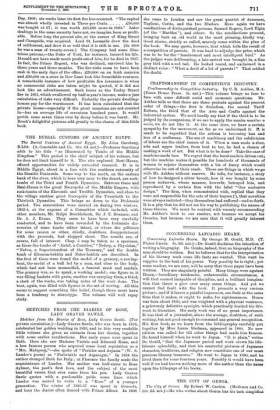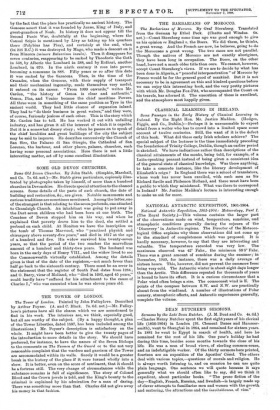THE CITY OF GENOA.
The City of Genoa. By Robert W. Carden. (Methuen and Co. 10s. 6d. net.)—He who writes about Genoa has his task simplified
by the fact that the place has practically no ancient history. The Genoese assert that it was founded by Janus, Xing of Italy, and great-grandson of Noah. In history it does not appear till the Second Punic War, doubtfully at the beginning, where the Consul Scipio is mentioned by Livy as taking up his quarters there (Polybius has Pisa), and certainly at the end, when (in 206 B.C.) it was destroyed by Mago, who made a descent on it from Minorca (minors Baleariunt inside). Then it disappears for seven centuries, reappearing to be sacked by Theodoric the Goth in 538, by Alberie the Lombard in 588, and by Rothari, another Lombard, in 670. In the ninth century it rose into power, becoming a commune in 888. Fifty years or so after this date it was sacked by the Saracens. Then, in the time of the Crusades, when the Genoese, with their supply of transport and their mechanical ingenuity, made themselves very useful, it entered on its career. " From 1099 onwards," writes Mr. Carden, " the history of Genoa is clear and authentic." Genoa, Pisa, and Venice became the chief maritime Powers. All three were in something of the same position as Tyre in the ancient world. They had little chance of expansion inland. They had to "do their business in great waters," and they were, of course, furiously jealous of each other. This is the story which Mr. Carden has to tell. He has worked it out with unfailing industry, and has given it all the interest of which it is capable. But it is a somewhat dreary story ; when he passes on to speak of the chief localities and great buildings of the city the subject may be said to improve. He describes successively the Church of San Sire, the Palazzo di San Giorgio, the Cathedral of San Lorenzo, the harbour, and other places, palaces, churches, each having some personal associations. Here there is not a little interesting matter, set off by some excellent illustrations.





























































 Previous page
Previous page